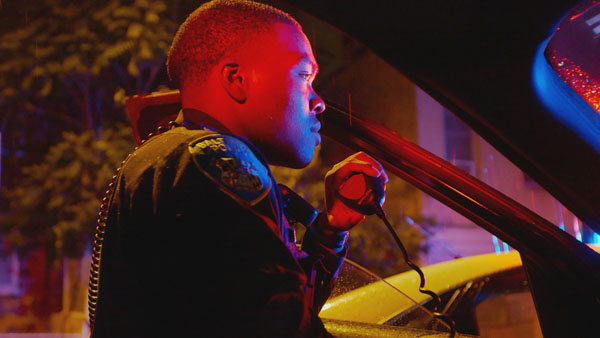![]() This impactful documentary kicks off in July 2015, at which point the city of Baltimore was well on the way to its highest number of murders in a single year. Director Marilyn Ness takes us beyond that onscreen factoid by focusing on how real people on the ground are striving to hold Baltimore together. Cutting back and forth between activists on the streets, police officers, and politicians, her film is an ambitious snapshot, which remarkably offers the occasional ray of hope.
This impactful documentary kicks off in July 2015, at which point the city of Baltimore was well on the way to its highest number of murders in a single year. Director Marilyn Ness takes us beyond that onscreen factoid by focusing on how real people on the ground are striving to hold Baltimore together. Cutting back and forth between activists on the streets, police officers, and politicians, her film is an ambitious snapshot, which remarkably offers the occasional ray of hope.
The earliest scenes introduce the charismatic Clayton Guyton, aka Mr. C, who runs the lone community center in a neighborhood with a high poverty and crime rate. He provides money to those who need bus fare or food; offers tough love to the young African American males who gather at his stoop, in hopes of steering them clear of gangs; and even manages the all-volunteer street cleaning service. To call him the heart and soul of North Rose Street seems apt, and he’s clearly had a positive effect on Alex Long, a protege who takes it upon himself to pay Mr. C’s kindnesses forward.
The film also follows a cross-section of police officers who tirelessly patrol the city. Mostly African-Americans, some of them grew up in or around Baltimore, although the group includes a white officer who comes from a small town and seems taken aback by much of what he sees on a daily basis. In addition, we spend a significant amount of time riding along with Officer Eric Winston, who tries to keep one foot in the community he patrols, though that doesn’t make him immune to the public’s widespread mistrust of the police.
Brandon Scott, a bright, young city councilman, disagrees with the established crime-fighting strategies advocated by many of his peers. Cutting back and forth between the three camps, Ness frames all of them as part of the same narrative: an attempt to pave the way to a brighter future for Baltimore by undoing the racist laws and practices that have blighted it for generations.
Ness reminds us of the city’s sad history through title cards: there are the decades-old housing laws, which funneled African Americans into certain neighborhoods; the disappearance of manufacturing jobs; and more recently, a shockingly high unsolved murder rate. The latter, combined with exacerbating events such as the 2015 death of Freddie Gray, has resulted in tension between residents and law enforcement that is constantly simmering.
At various points, we witness a firsthand look at that tension. During the ride-alongs with Officer Winston and others, onlookers constantly hurl verbal abuse at the officers, who largely brush them off. Though viewers sympathize with them, they can also understand that over-policing is most definitely a problem on North Rose Street as Long and his sister have run-ins with cops that threaten to turn ugly. Ness takes a big picture view of all this tension. Though residents have every right to lose faith in the police, the filmmaker never loses sight of the good cops. Meanwhile, sometimes the larger system fails everyone: Officer Winston makes a bust, but it ends up overturned on a legal technicality.
Though Charm City has more than its share of hard-hitting moments, Ness occasionally livens things up with dark humor. Responding to a call, Winston pulls up near a group of kids drumming on the street, and they immediately freeze until he assures them that it’s okay for them to keep playing. Ness, directing her second feature, allows real life to unfold at its own speed right up until the moment of the improvised drumline. Then the backbeat kicks off an extended montage, which compresses a period of months into a single rapid-fire sequence.
Although the subjects in the film’s three main threads never cross paths, it gradually becomes apparent that many share similar life experiences—in particular, childhoods scarred by poverty and/or drug abuse. This echoes something said by Councilman Scott at one point, that residents and police have more in common with each other than they realize. By the end, there’s no easy answer for Baltimore’s problems. Yet by focusing on real people who are trying to make a difference, Charm City humanizes the city.
Charm City will screen at the Human Rights Watch 2018 on June 20.







Leave A Comment